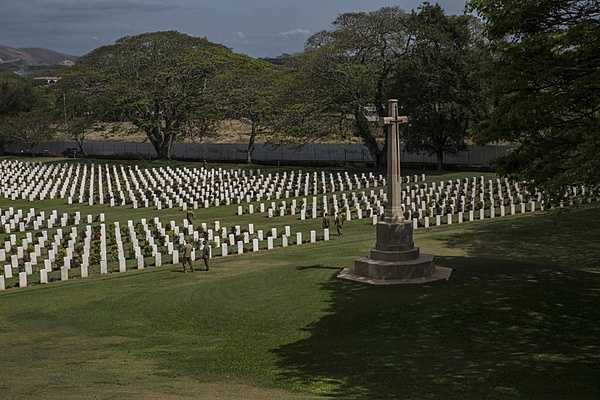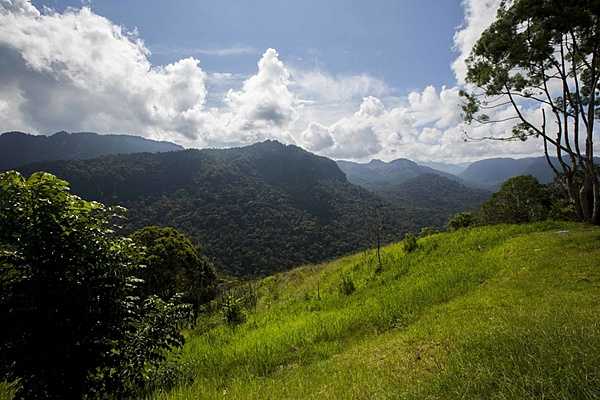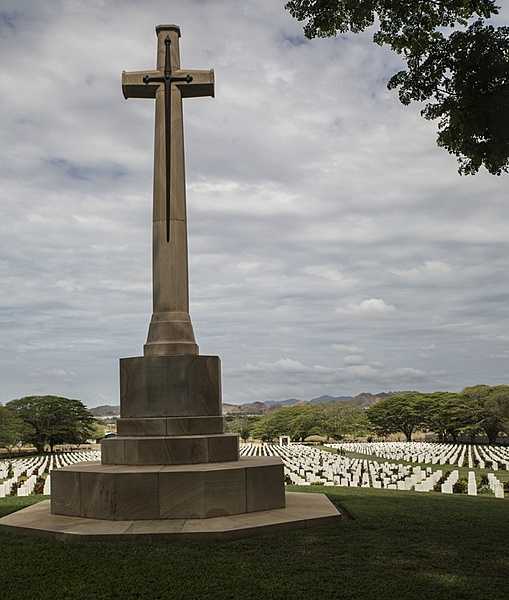Papua New Guinea - PG - PNG - PNG - East and Southeast Asia
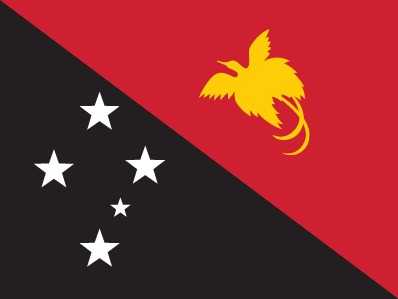
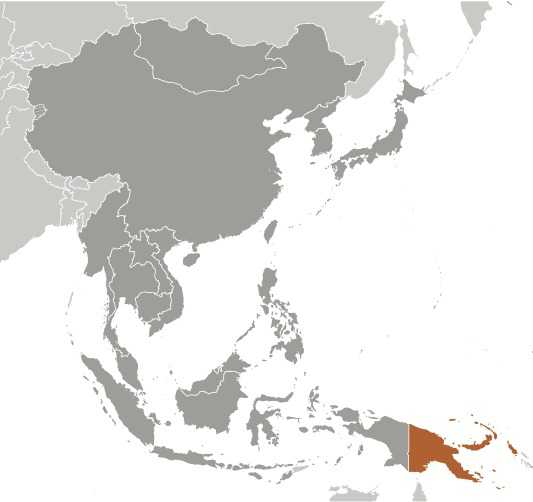
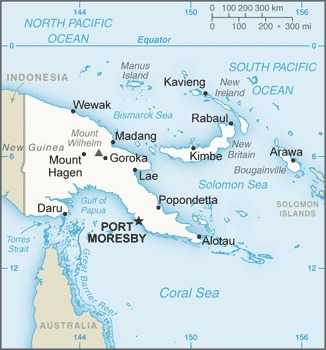
Papua New Guinea Images
Papua New Guinea Factbook Data
Diplomatic representation from the US
embassy: Harbour City Road, Konedobu, Port Moresby, NCD, Papua New Guinea
mailing address: 4240 Port Moresby Pl, Washington DC 20521-4240
telephone: [675] 308-9100
email address and website:
ConsularPortMoresby@state.gov
https://pg.usembassy.gov/
Age structure
15-64 years: 58.9% (male 2,991,479/female 2,923,410)
65 years and over: 4% (2024 est.) (male 198,511/female 205,090)
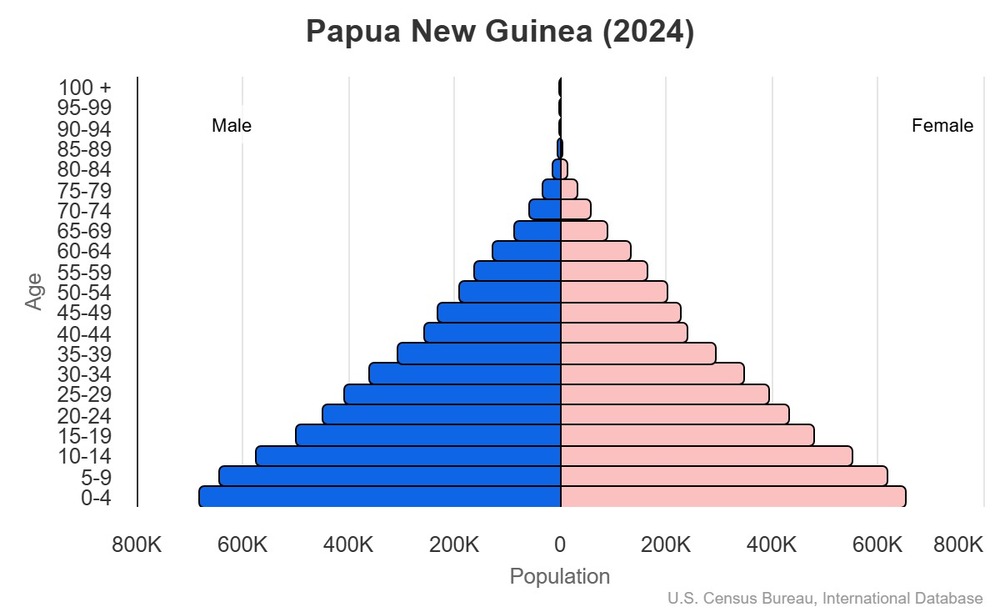
For additional information, please see the entry for Population pyramid on the Definitions and Notes page.
Geographic coordinates
Sex ratio
0-14 years: 1.04 male(s)/female
15-64 years: 1.02 male(s)/female
65 years and over: 0.97 male(s)/female
total population: 1.03 male(s)/female (2024 est.)
Natural hazards
volcanism: severe volcanic activity; Ulawun (2,334 m), one of Papua New Guinea's potentially most dangerous volcanoes, has been deemed a Decade Volcano by the International Association of Volcanology and Chemistry of the Earth's Interior, worthy of study due to its explosive history and close proximity to human populations; Rabaul (688 m) destroyed the city of Rabaul in 1937 and 1994; Lamington erupted in 1951, killing 3,000 people; Manam's 2004 eruption forced the island's abandonment; other historically active volcanoes include Bam, Bagana, Garbuna, Karkar, Langila, Lolobau, Long Island, Pago, St. Andrew Strait, Victory, and Waiowa; see note 2 under "Geography - note"
People - note
Area - comparative
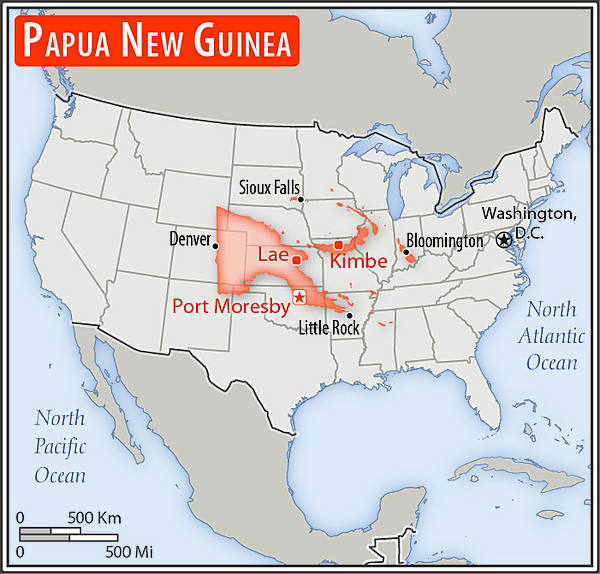
slightly larger than California
Military service age and obligation
Background
Papua New Guinea (PNG) occupies the eastern half of the island of New Guinea; the western half is part of Indonesia. PNG was first settled between 50,000 and 60,000 years ago. Its harsh geography of mountains, jungles, and numerous river valleys kept many of the arriving groups isolated, giving rise to PNG’s ethnic and linguistic diversity. Around 500 B.C., Austronesian voyagers settled along the coast. Spanish and Portuguese explorers periodically visited the island starting in the 1500s, but none made it into the country’s interior. American and British whaling ships frequented the islands off the coast of New Guinea in the mid-1800s. In 1884, Germany declared a protectorate -- and eventually a colony -- over the northern part of what would become PNG and named it German New Guinea; days later the UK followed suit on the southern part and nearby islands and called it Papua. Most of their focus was on the coastal regions, leaving the highlands largely unexplored.
The UK put its colony under Australian administration in 1902 and formalized the act in 1906. At the outbreak of World War I, Australia occupied German New Guinea and continued to rule it after the war as a League of Nations Mandate. The discovery of gold along the Bulolo River in the 1920s led prospectors to venture into the highlands, where they found about 1 million people living in isolated communities. The New Guinea campaign of World War II lasted from January 1942 to the Japanese surrender in August 1945. After the war, Australia combined the two territories and administered PNG as a UN trusteeship. In 1975, PNG gained independence and became a member of the Commonwealth.
Between 1988-1997, a secessionist movement on the island province of Bougainville, located off the eastern PNG coast, fought the PNG Government, resulting in 15,000-20,000 deaths. In 1997, the PNG Government and Bougainville leaders reached a cease-fire and subsequently signed a peace agreement in 2001. The Autonomous Bougainville Government was formally established in 2005. Bougainvilleans voted in favor of independence in a 2019 non-binding referendum. The Bougainville and PNG governments are in the process of negotiating a roadmap for independence, which requires approval by the PNG parliament.
Environmental issues
International environmental agreements
signed, but not ratified: Comprehensive Nuclear Test Ban
Military expenditures
0.3% of GDP (2023 est.)
0.3% of GDP (2022 est.)
0.4% of GDP (2021 est.)
0.4% of GDP (2020 est.)
Exports - commodities
note: top five export commodities based on value in dollars
Exports - partners
note: top five export partners based on percentage share of exports
Administrative divisions
Agricultural products
note: top ten agricultural products based on tonnage
Military and security forces
Ministry of Internal Security: Royal Papua New Guinea Constabulary (RPNGC) (2025)
Budget
expenditures: $6.856 billion (2023 est.)
note: central government revenues and expenses (excluding grants/extrabudgetary units/social security funds) converted to US dollars at average official exchange rate for year indicated
Capital
geographic coordinates: 9 27 S, 147 11 E
time difference: UTC+10 (15 hours ahead of Washington, DC, during Standard Time)
time zone note: Papua New Guinea has two time zones, including Bougainville (UTC+11)
etymology: named in 1873 by Captain John MORESBY in honor of his father, British Admiral Sir Fairfax MORESBY (1786-1877)
Imports - commodities
note: top five import commodities based on value in dollars
Climate
Coastline
Constitution
amendment process: proposed by the National Parliament; passage has prescribed majority vote requirements depending on the constitutional sections being amended – absolute majority, two-thirds majority, or three-fourths majority
Exchange rates
Exchange rates:
3.59 (2023 est.)
3.519 (2022 est.)
3.509 (2021 est.)
3.46 (2020 est.)
3.388 (2019 est.)
Executive branch
head of government: Prime Minister James MARAPE (since 30 May 2019)
cabinet: National Executive Council appointed by the governor general on the recommendation of the prime minister
election/appointment process: the monarchy is hereditary; governor general nominated by the National Parliament and appointed by the chief of state; following legislative elections, the governor general usually appoints the leader of the majority party or majority coalition as prime minister, pending a National Parliament vote
election results: James MARAPE reelected prime minister; National Parliament vote - 105 out of 118
Flag
meaning: red, black, and yellow are the country's traditional colors; the bird of paradise is an emblem of regional tribal culture and represents the emergence of Papua New Guinea as a nation; the Southern Cross symbolizes the country's connection with Australia and several other countries in the South Pacific
Independence
Industries
Judicial branch
judge selection and term of office: Supreme Court chief justice appointed by the governor general on advice of the National Executive Council (cabinet) after consultation with the National Justice Administration minister; deputy chief justice and other justices appointed by the Judicial and Legal Services Commission, a 5-member body that includes the Supreme Court chief and deputy chief justices, the chief ombudsman, and a member of the National Parliament; full-time citizen judges appointed for 10-year renewable terms; non-citizen judges initially appointed for 3-year renewable terms and after first renewal can serve until age 70; appointment and tenure of National Court resident judges NA
subordinate courts: district, village, and juvenile courts, military courts, taxation courts, coronial courts, mining warden courts, land courts, traffic courts, committal courts, grade five courts
Land boundaries
border countries (1): Indonesia 824 km
Land use
arable land: 0.7% (2023 est.)
permanent crops: 2% (2023 est.)
permanent pasture: 0.4% (2023 est.)
forest: 75.2% (2023 est.)
other: 21.7% (2023 est.)
Legal system
Legislative branch
legislative structure: unicameral
number of seats: 118 (all directly elected)
electoral system: plurality/majority
scope of elections: full renewal
term in office: 5 years
most recent election date: 7/4/2022 to 7/22/2022
parties elected and seats per party: Papua & Niugini Union Pati (PANGU) (39); People's National Congress Party (PNC) (15); United Resource Party (URP) (11); Others (40); Independents (10)
percentage of women in chamber: 2.7%
expected date of next election: July 2027
Literacy
male: 78.4% (2017 est.)
female: 61.6% (2017 est.)
Maritime claims
continental shelf: 200-m depth or to the depth of exploitation
exclusive fishing zone: 200 nm
note: measured from claimed archipelagic baselines
International organization participation
National holiday
Nationality
adjective: Papua New Guinean
Natural resources
Geography - note
note 2: Papua New Guinea is one of the countries along the Ring of Fire, which is a belt bordering the Pacific Ocean that contains about 75% of the world's volcanoes and up to 90% of the world's earthquakes
Economic overview
lower-middle-income Pacific island economy; primarily informal agrarian sector; natural-resource-rich and key exporter of liquified natural gas; collapse in betel nut prices, tighter monetary policy, and improved foreign-exchange availability contributing to declining inflation; challenges include lack of progress in infrastructure, agricultural reform, and corruption
Political parties
Liberal Party
Melanesian Alliance Party or MAP
Melanesian Liberal Party or MLP
National Alliance Party or NAP
Our Development Party or ODP
Papua and Niugini Union Party or PANGU PATI
Papua New Guinea Greens Party
Papua New Guinea National Party
Papua New Guinea Party or PNGP
People's First Party or PFP
People's Movement for Change or PMC
People's National Congress Party or PNC
People’s National Party
People's Party or PP
People's Progress Party or PPP
People's Reform Party or PRP
Social Democratic Party or SDP
Triumph Heritage Empowerment Party or THE
United Labor Party or ULP
United Resources Party or URP
Suffrage
Terrain
Government type
Country name
conventional short form: Papua New Guinea
local short form: Papuaniugini
former: German New Guinea, British New Guinea, Territory of Papua and New Guinea
abbreviation: PNG
etymology: the name derives from the Malay word pua-pua, describing the tightly curled hair of the Papuan people; Spanish explorer Ynigo ORTIZ de RETEZ applied the term "Nueva Guinea" to the island in 1545 because he thought the locals resembled the peoples of the Guinea coast of Africa
Location
Map references
Irrigated land
Diplomatic representation in the US
chancery: 1825 K Street NW, Suite 1010, Washington, DC 20006
telephone: [1] (202) 745-3680
FAX: [1] (202) 745-3679
email address and website:
info@pngembassy.org
http://www.pngembassy.org/
Internet users
Internet country code
Refugees and internally displaced persons
IDPs: 107,985 (2024 est.)
GDP (official exchange rate)
note: data in current dollars at official exchange rate
Trafficking in persons
Total renewable water resources
Urbanization
rate of urbanization: 2.91% annual rate of change (2020-25 est.)
Broadcast media
Drinking water source
urban: 86.9% of population (2022 est.)
rural: 44.5% of population (2022 est.)
total: 50.2% of population (2022 est.)
unimproved:
urban: 13.1% of population (2022 est.)
rural: 55.5% of population (2022 est.)
total: 49.8% of population (2022 est.)
National anthem(s)
lyrics/music: Thomas SHACKLADY
history: adopted 1975
Major urban areas - population
International law organization participation
Physician density
National symbol(s)
GDP - composition, by end use
government consumption: 19.7% (2017 est.)
investment in fixed capital: 10% (2017 est.)
investment in inventories: 0.4% (2017 est.)
exports of goods and services: 49.3% (2017 est.)
imports of goods and services: -22.3% (2017 est.)
Dependency ratios
youth dependency ratio: 63 (2024 est.)
elderly dependency ratio: 6.8 (2024 est.)
potential support ratio: 14.7 (2024 est.)
Citizenship
citizenship by descent only: at least one parent must be a citizen of Papua New Guinea
dual citizenship recognized: no
residency requirement for naturalization: 8 years
Population distribution
Electricity access
electrification - urban areas: 65.1%
electrification - rural areas: 14.2%
Civil aircraft registration country code prefix
Sanitation facility access
urban: 57.8% of population (2022 est.)
rural: 18.2% of population (2022 est.)
total: 23.6% of population (2022 est.)
unimproved:
urban: 42.2% of population (2022 est.)
rural: 81.8% of population (2022 est.)
total: 76.4% of population (2022 est.)
Ethnic groups
Religions
note: data represent only the citizen population; roughly 0.3% of the population are non-citizens, consisting of Christian 52% (predominantly Roman Catholic), other 10.7% , none 37.3%
Languages
note: Tok Pisin, a creole language, is widely used and understood; English is spoken by 1%-2%; Hiri Motu is spoken by less than 2%
Imports - partners
note: top five import partners based on percentage share of imports
Military - note
since 2023, Papua New Guinea has signed bilateral defense cooperation agreements with Australia, Indonesia, the UK, and the US; the 2023 defense cooperation agreement with the US allowed the US military to develop and operate out of bases in PNG with the PNG Government’s approval; PNG has also military relations with France and New Zealand and has discussed a security cooperation agreement with China
the PNGDF was established in 1973, and its primary combat unit, the Royal Pacific Islands Regiment (RPIR), is descended from Australian Army infantry battalions comprised of native soldiers and led by Australian officers and non-commissioned officers formed during World War II to help fight the Japanese; the RPIR was disbanded after the war, but reestablished in 1951 as part of the Australian Army where it continued to serve until PNG gained its independence in 1975, when it became part of the PNGDF (2025)
Elevation
lowest point: Pacific Ocean 0 m
mean elevation: 667 m
Health expenditure
7% of national budget (2022 est.)
Military and security service personnel strengths
Hospital bed density
Total water withdrawal
industrial: 167.6 million cubic meters (2022 est.)
agricultural: 1 million cubic meters (2022 est.)
Waste and recycling
percent of municipal solid waste recycled: 6.3% (2022 est.)
Mother's mean age at first birth
note: data represents median age a first birth among women 25-49
Major rivers (by length in km)
National heritage
selected World Heritage Site locales: Kuk Early Agricultural Site
Child marriage
women married by age 18: 27.3% (2018)
men married by age 18: 3.7% (2018)
Coal
Electricity generation sources
solar: 0.1% of total installed capacity (2023 est.)
hydroelectricity: 21.2% of total installed capacity (2023 est.)
geothermal: 2% of total installed capacity (2023 est.)
biomass and waste: 0.3% of total installed capacity (2023 est.)
Natural gas
consumption: 677.736 million cubic meters (2023 est.)
exports: 10.892 billion cubic meters (2023 est.)
proven reserves: 183.125 billion cubic meters (2021 est.)
Petroleum
refined petroleum consumption: 30,000 bbl/day (2023 est.)
crude oil estimated reserves: 159.656 million barrels (2021 est.)
Currently married women (ages 15-49)
Remittances
0% of GDP (2022 est.)
0% of GDP (2021 est.)
note: personal transfers and compensation between resident and non-resident individuals/households/entities
Ports
large: 0
medium: 0
small: 6
very small: 16
ports with oil terminals: 8
key ports: Kavieng Harbor, Kieta, Port Moresby, Rabaul, Vanimo, Wewak Harbor
National color(s)
National coat of arms
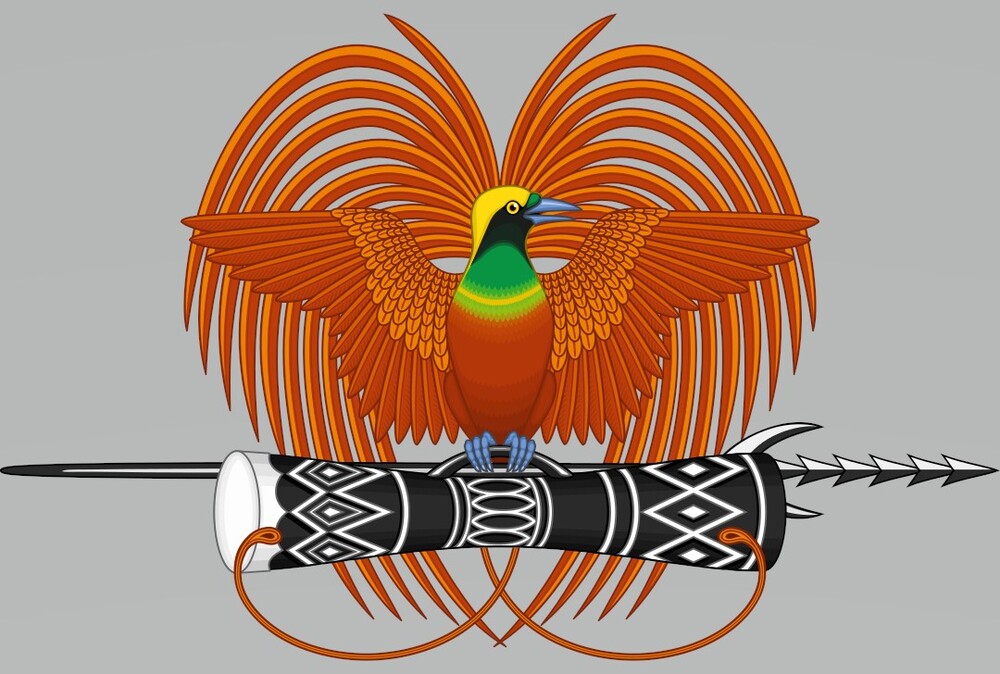
Particulate matter emissions
Labor force
note: number of people ages 15 or older who are employed or seeking work
Youth unemployment rate (ages 15-24)
male: 4.6% (2024 est.)
female: 3% (2024 est.)
note: % of labor force ages 15-24 seeking employment
Debt - external
note: present value of external debt in current US dollars
Maternal mortality ratio
Reserves of foreign exchange and gold
$3.983 billion (2022 est.)
$3.24 billion (2021 est.)
note: holdings of gold (year-end prices)/foreign exchange/special drawing rights in current dollars
Public debt
note: central government debt as a % of GDP
Unemployment rate
2.7% (2023 est.)
2.7% (2022 est.)
note: % of labor force seeking employment
Population
male: 5,092,262
female: 4,953,971
Carbon dioxide emissions
from coal and metallurgical coke: 1,000 metric tonnes of CO2 (2023 est.)
from petroleum and other liquids: 4.467 million metric tonnes of CO2 (2023 est.)
from consumed natural gas: 1.33 million metric tonnes of CO2 (2023 est.)
Area
land: 452,860 sq km
water: 9,980 sq km
Taxes and other revenues
note: central government tax revenue as a % of GDP
Real GDP (purchasing power parity)
$43.697 billion (2023 est.)
$42.093 billion (2022 est.)
note: data in 2021 dollars
Airports
Telephones - mobile cellular
subscriptions per 100 inhabitants: 48 (2021 est.)
Inflation rate (consumer prices)
2.3% (2023 est.)
5.3% (2022 est.)
note: annual % change based on consumer prices
Current account balance
$4.567 billion (2022 est.)
$3.284 billion (2021 est.)
note: balance of payments - net trade and primary/secondary income in current dollars
Real GDP per capita
$4,200 (2023 est.)
$4,100 (2022 est.)
note: data in 2021 dollars
Broadband - fixed subscriptions
subscriptions per 100 inhabitants: (2022 est.) less than 1
Tobacco use
male: 53.4% (2025 est.)
female: 23.8% (2025 est.)
Obesity - adult prevalence rate
Energy consumption per capita
Electricity
consumption: 4.399 billion kWh (2023 est.)
transmission/distribution losses: 328.234 million kWh (2023 est.)
Merchant marine
by type: container ship 6, general cargo 89, oil tanker 4, other 106
Imports
$8.568 billion (2022 est.)
$6.43 billion (2021 est.)
note: balance of payments - imports of goods and services in current dollars
Exports
$14.862 billion (2022 est.)
$11.032 billion (2021 est.)
note: balance of payments - exports of goods and services in current dollars
Heliports
Telephones - fixed lines
subscriptions per 100 inhabitants: 2 (2022 est.)
Alcohol consumption per capita
beer: 0.6 liters of pure alcohol (2019 est.)
wine: 0.06 liters of pure alcohol (2019 est.)
spirits: 0.6 liters of pure alcohol (2019 est.)
other alcohols: 0 liters of pure alcohol (2019 est.)
Life expectancy at birth
male: 68.3 years
female: 71.9 years
Real GDP growth rate
3.8% (2023 est.)
5.7% (2022 est.)
note: annual GDP % growth based on constant local currency
Industrial production growth rate
note: annual % change in industrial value added based on constant local currency
GDP - composition, by sector of origin
industry: 37.2% (2024 est.)
services: 41.5% (2024 est.)
note: figures may not total 100% due to non-allocated consumption not captured in sector-reported data
Education expenditure
3.5% national budget (2023 est.)
Military equipment inventories and acquisitions
Gross reproduction rate
Net migration rate
Median age
male: 21.6 years
female: 21.9 years
Total fertility rate
Infant mortality rate
male: 35.3 deaths/1,000 live births
female: 28.6 deaths/1,000 live births
